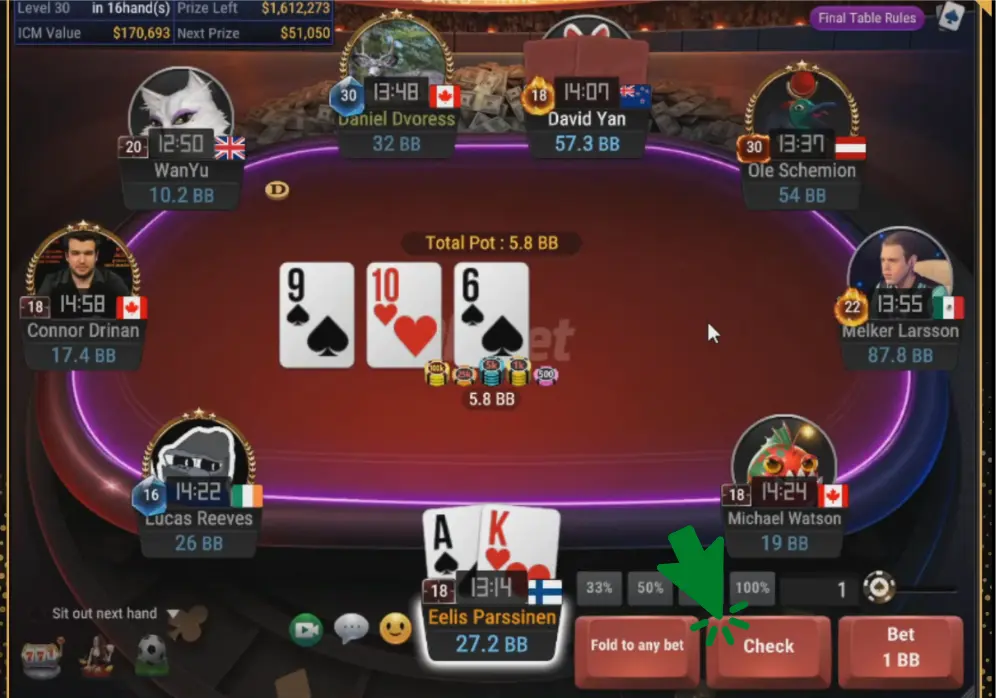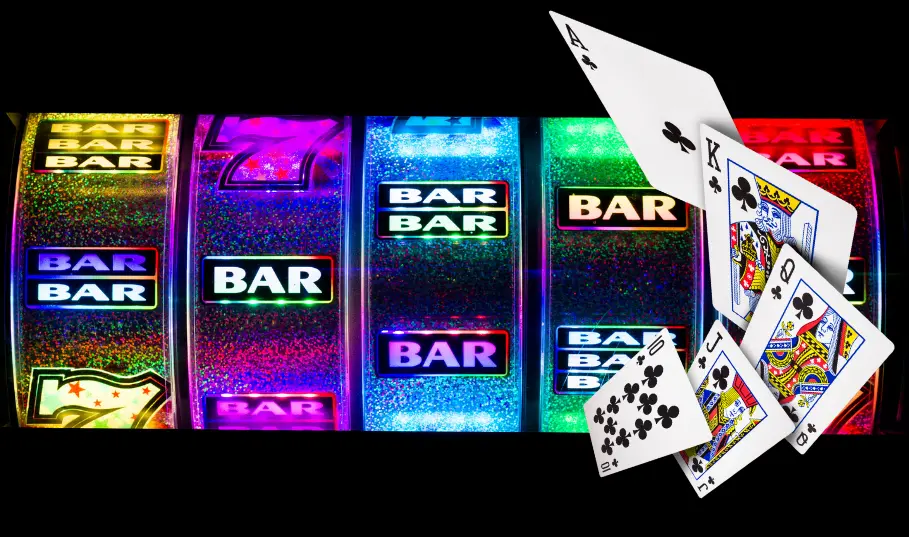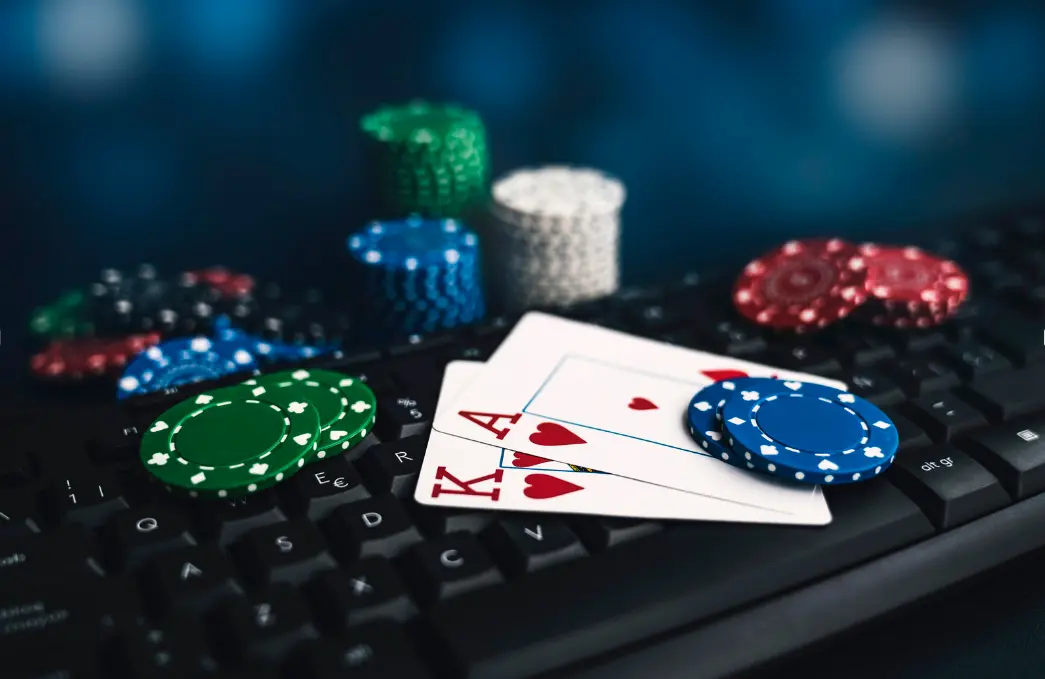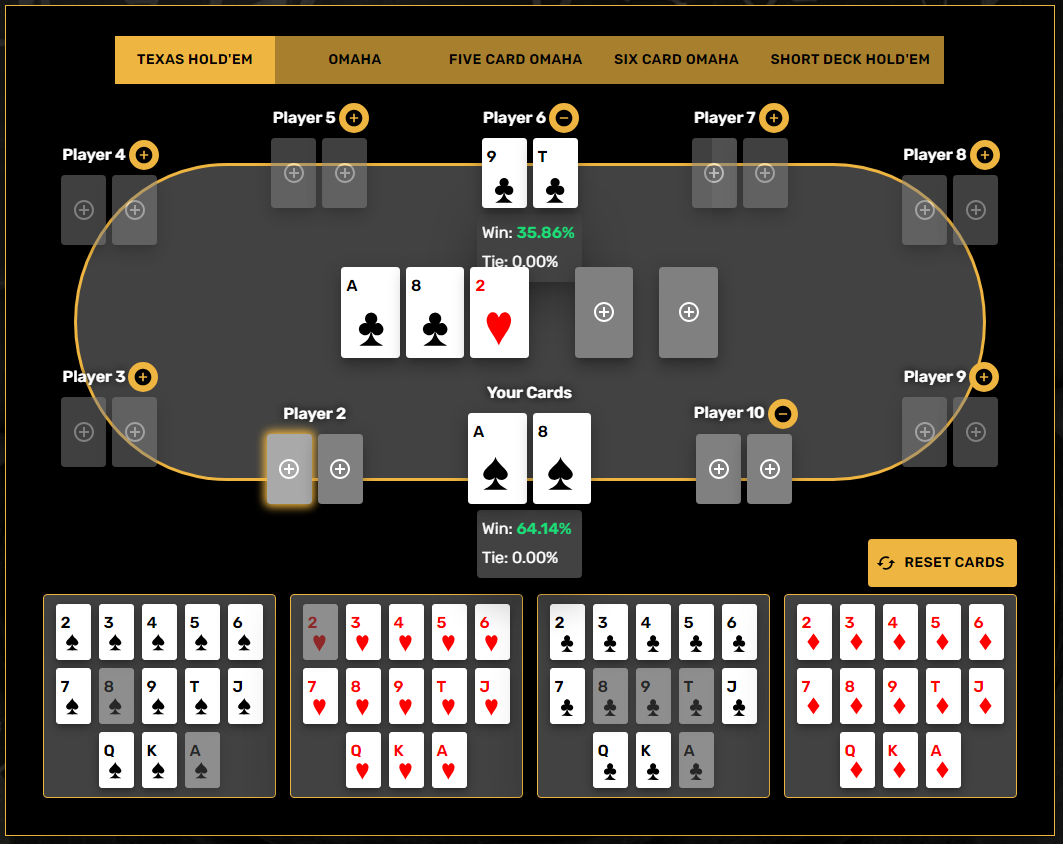In short, checking in poker simply means choosing not to bet when it’s your turn to act. When there are no bets or raises in place and its your turn, you have three options:
- Check
- Bet
- Fold
Folding when there are no bets is a very poor strategy in poker, as you simply give up your hand even if the there is price to pay for seeing what happens next. So the two viable options you have left are checking or betting.
Let’s discover when you can and can’t check in poker, how to use it as part of your poker strategy, and some common situations where checking makes sense and how to avoid common checking mistakes in poker:
When can you check in poker
When you’re first to act you can decide if you want to bet or check. The same holds true if the other players have checked over to you. In both No-Limit Holdem and Pot-Limit Omaha, the opportunities to check are during the flop, the turn or the river. During the preflop betting round, you need to either call or raise, unless you’re in the Big Blind and no one has made a raise when the action is over to you.
Players may choose to check for various reasons, such as wanting to see how others will act before committing more chips or to avoid revealing the true strength of their hand. For instance, a you may want to check when:
- Holding a weak hand in hopes of bluffing later on if other players show no interest in the pot either
- When holding a strong hand to induce other players to bet either by bluffing or with mediocre hands
The decision to check is a strategic one. A check at any point during a poker hand can greatly impact the outcome of the game – it really can make the difference between luring your opponent to bluff their whole stack to you. On the flipside, it might lead you to win very little with a strong holding against a passive opponent, when a bet would have been a much better option strategically.
When to check in poker
While a balanced poker strategy uses both checks and bets for most hands postflop, you can use a few general guidelines for navigating decisions. This makes your game simplified and effective – and easier to keep playing your A-game!
Marginal showdown value hands
Marginal showdown hands like second pair are great candidates for checking for two reasons:
- Avoid being forced to fold later in the hand: By checking, you avoid building a large pot when you’re likely behind. If you bet with a marginal hand and get raised, you’re put in a difficult spot where you might be forced to fold a hand that has some value.
- Inducing Bluffs: By checking, you can induce your opponent to bluff on later streets. If you believe your opponent might try to steal the pot with a worse hand, checking is great as it allows your opponent to put money in the pot with ‘air balls’ i.e. hands that have no pair and are not draws.
Super nutted made hands for trapping purposes
With a very strong made hand that blocks other combinations of strong hands, checking can make sense when you aim to extract value from opponents who likely have mediocre hands or nothing. Here’s key reasons why checking with them makes sense:
- Allowing your opponent to draw to the second best hand: Especially in multi-way pots where you have board completely crushed with a hand like four of a kind or a full house, checking the nuts can allow other players to catch up slightly. This makes more likely to commit chips to the pot on later streets, not realizing they’re going to lose. This can be particularly effective if there are drawing hands that opponents might be chasing, like flush or straight draws.
- Trapping: By checking a very strong made hand, you can set a trap for your opponent. You lead them to believe they have the best hand and betting more on later streets, allowing you to extract maximum value with your strong made hand.
- Balancing Your Range: If you always bet or raise with the nuts, observant opponents will notice this pattern and fold when you show aggression. By occasionally checking the nuts, you make your play less predictable and keep your opponents guessing.
- Shallow Stack Sizes: If you or your opponent has a short stack, you may want to give them the opportunity to commit more (or all) of their chips on later streets, believing they have the best hand.
When to bet instead of checking in poker

You’ve likely heard that aggressive players win more money in poker. It’s usually simply due to the fact that most players make more mistakes against aggressive players than passive ones. Here are some scenarios and reasons when you might choose to bet instead of checking:
- Value Betting: When you believe you have the best hand, you bet to get called by worse hands. Value betting is the most common strategy to make money playing poker.
- Bluffing: If you think you can make better hands fold by representing a strong hand, you might choose to bluff. This is especially effective against players who are likely to fold to aggression or on board textures that are unfavorable to your opponent’s range. Plus points if you have a backdoor draw on the flop, or a weak hand with some equity like a gutshot straight draw.
- Charging opponents for seeing the next community card and realizing their equity: By betting your made hands you charge opponents with potential draws. For example, if you have a top pair on a board with two suited cards, you might bet to charge opponents for drawing to a flush.
- Building the Pot: If you have a strong hand or a hand with significant potential (like a strong combo draw), you might bet to build a bigger pot, aiming to win more chips when you hit your draw.
- Probing: Sometimes, after everyone checks in a previous betting round, a player might bet to “probe” and gather information about the strength of opponents’ hands and make some marginal hands fold.
- Denying Equity: By betting, you deny your opponents the chance to realize their equity with marginal hands or draws, especially if they’re unlikely to call a bet.
- Setting up bluffs for later streets: Betting is a powerful move especially in position when everyone has checked to you – even if your hand is weak! By betting in this case, you can set you up for potential bluffs on later streets and put your opponents in tough spots.
- Exploiting Opponent Tendencies: If you’re against a particularly passive player who rarely fights back against aggression, frequent betting with most of your range can be a profitable strategy. Conversely, against very loose players who call too often, you might bet more for value instead.
While these are some common reasons to bet instead of check, it’s essential to understand that you need to study and play a lot of poker to learn when to bet and when to check. Each hand and situation can be unique, and the best decision often depends on various factors, including table dynamics, opponent profiles, and your perceived table image. Some things can only be gained by experience – and poker skills are one of those things!
How to check in online poker
Poker rules are the same whether you play online or live – for checking in online poker, you simply have a button with text ‘CHECK’ in front of you once it’s your turn. If you want to play poker online, here are a few recommended poker sites where you can claim a big welcome bonus package:
- BlackChip Poker with a $2,000 Welcome Bonus for new players
- Americas Cardroom with a $2,000 Welcome Bonus for new players
- WPT Global with a $1,200 Welcome Bonus for new players
- GGPoker with a $1,200 Welcome Bonus for new players
- Bet365 Poker with a €365 Welcome Bonus for new players (they also have casino games that you can read more about here)
How to check in live poker
Checking in live poker is easy: Simply tap the table with your fingers or fist gently, or announce ‘check’ to the dealer. Once you’ve checked, you can’t change your decision. So make sure to take your time to think whether you want to check or bet before making a move.
Looking to try out live poker in the US? Feel free to check out our guide to live poker rooms in the US.
Common Mistakes Related to Checks
When you first start playing poker, you have a natural tendency to play a lot of trashy hands, see a lot of flops and generally play too passive. And if you’ve read our article on different styles of playing poker, you know that passive strategy is a losing one. Aggression in poker gives you the advantage to win the pot before reaching the showdown and preventing your opponent from realizing their equity. At the same time, it allows you to grow the pot and win bigger pots on average when you do make a strong hand. With that said, we can reveal the first mistake which is checking too much:
Overusing Checks
Overusing checks in poker can negatively impact your win-rate. By relying too heavily on checks, you may miss opportunities to bet and raise and potentially win the pot without a showdown. The same holds true for winning too little when you have a strong holding. Especially if you play micro stakes or low stakes cash games, it’s usually in a player pool where trappy playing style is not rewarded. You’re better off keeping the pedal to medal by betting!
Besides, you don’t want to check too much in high stakes games either. A balanced poker strategy involves a mix of bets, raises, and checks to keep your opponents guessing and not catching up on your patterns. If you study GTO (game theory optimal) poker with poker solvers, you’ll see that there’s a mix of strategies used for almost every range of hands in every situation.
For example, consistently checking when holding a strong hand can allow opponents with weak draws to catch up and potentially beat you. Instead, bet your strong hands most of the time unless you completely crush the board and it’s unlikely your opponent will outdraw you, for example if you hold pocket queens on a flow of Q73 rainbow.
Failing to punish players who check too much
When you face passive players who are not betting much postflop, you can exploit them with various strategies. The first one is realizing your equity with marginal hands that have showdown value, but you don’t want to grow the pot with. Against players who check too much, you just check to them or check behind, and it’s likely you get a free showdown.
The second important strategy is betting your strong hands and backdoor draws that have very slim chances to win at the showdown. Players who check too much are unlikely to bet when you hold a strong hand, so you need to grow the pot by being the aggressor. Also, you need to make multistreet bluffs from time to time with hands that can improve to strong ones but are currently very weak (backdoor flush draws, overcards, gutshots, bottom pair with no kicker). Be careful though not to bluff too much if you’re up against a calling station who is curious to see whether they win or not, no matter the price!









